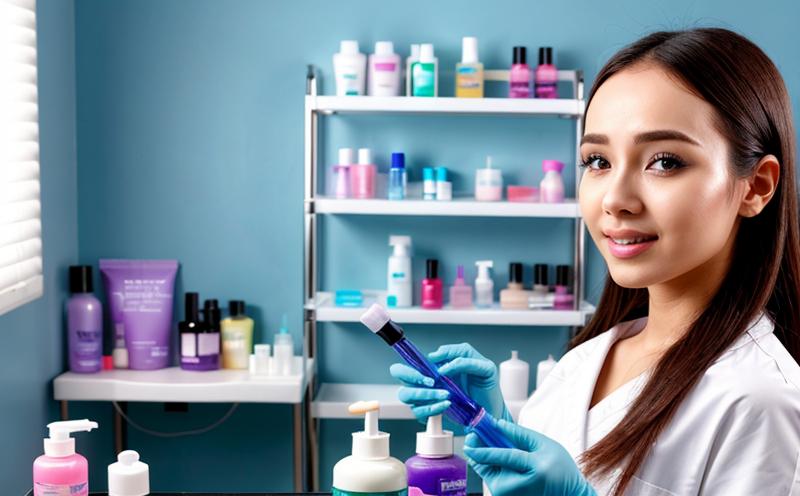EN 13624 Fungicidal Testing for Antimicrobial Personal Care Products
The European Standard EN 13624 specifies a standardized procedure for determining the fungicidal activity of antimicrobial personal care products. This test is crucial in ensuring that cosmetic and personal care products meet stringent hygiene standards, thereby protecting end-users from fungal infections.
The procedure outlined in this standard involves exposing test samples to various fungi under controlled conditions and measuring their ability to inhibit fungal growth. The results provide a quantifiable measure of the fungicidal efficacy, which is essential for product safety and regulatory compliance.
Quality managers rely on such tests to ensure that products are not only effective against fungi but also safe for use. Compliance officers must be aware of these standards as they guide the development and manufacturing processes, ensuring that products meet international regulations.
R&D engineers benefit from this testing by refining formulations based on fungicidal activity data. This iterative process enhances product performance while minimizing potential risks associated with microbial contamination. For procurement teams, understanding EN 13624 helps in selecting suppliers who adhere to these stringent hygiene standards.
The test protocol involves several critical steps: preparation of the test samples, inoculation with selected fungal strains, incubation under controlled conditions, and assessment of fungicidal activity. The fungi used are typically Candida albicans and Tupleasandromyces rubrum, as specified in EN 13624.
The test samples undergo pre-treatment to ensure consistency and replicability. This includes homogenization, dilution, or other necessary preparatory steps depending on the product type. Post-treatment analysis involves evaluating the extent of fungal inhibition over a defined period.
Instrumentation plays a vital role in this testing process. Automated incubators and microbiological analysis systems are used to monitor environmental conditions such as temperature, humidity, and exposure time accurately. These instruments ensure precise control over variables that can affect the outcome of the test.
The results from EN 13624 fungicidal testing provide valuable insights into product efficacy, guiding further research and development efforts. The data generated is crucial for meeting regulatory requirements and ensuring consumer safety. Regulatory bodies like the European Commission mandate compliance with such standards to protect public health.
Understanding the scope of this standard helps stakeholders align their processes with international best practices. This alignment not only ensures product quality but also facilitates market entry into regions where these standards are enforced. For instance, countries in the European Union and other parts of the world that follow similar regulatory frameworks benefit from such compliance.
International Acceptance and Recognition
- EN 13624 is widely recognized across Europe as a standard for fungicidal testing in cosmetics. It has been adopted by several countries within the EU, ensuring consistency in product safety and efficacy.
- This standard is also accepted in various international markets, including North America and Asia-Pacific regions, where regulatory bodies incorporate it into their guidelines for personal care products.
- Global pharmaceutical companies often use EN 13624 to ensure uniformity in quality control processes across different manufacturing sites worldwide. This standardization minimizes discrepancies between local regulations and global standards.
The widespread adoption of this standard reflects its importance in the global market, where product safety is a paramount concern. Compliance with EN 13624 not only enhances consumer trust but also facilitates easier trade across borders.
Environmental and Sustainability Contributions
The fungicidal testing procedure described in EN 13624 contributes significantly to environmental sustainability by promoting the development of safer personal care products. By ensuring that antimicrobial agents are effective against fungi, these tests help reduce the need for overuse or misuse of such agents.
Effective fungicidal activity reduces the risk of fungal contamination, which in turn decreases the likelihood of product recalls and associated environmental impacts. This standard encourages manufacturers to use eco-friendly ingredients and processes that enhance overall sustainability.
The data generated from these tests can be used to inform sustainable practices throughout the supply chain, from raw material sourcing to end-product disposal. Compliance with EN 13624 ensures that products are not only safe but also environmentally responsible, aligning with broader sustainability goals.
Competitive Advantage and Market Impact
Compliance with EN 13624 provides a competitive advantage in the personal care market by ensuring product safety and efficacy. This standard sets a benchmark for quality that is recognized globally, giving brands a strong foundation to compete in international markets.
Manufacturers who adhere to this standard can differentiate their products by highlighting the rigorous testing procedures they have followed. This transparency builds trust with consumers, enhancing brand reputation and loyalty.
The test results also provide valuable insights for product development, allowing companies to innovate and improve formulations continuously. This ongoing improvement keeps products at the forefront of market trends, maintaining a competitive edge.
Furthermore, compliance with EN 13624 can lead to increased sales by ensuring that products meet strict hygiene standards, which is particularly important in regions where public health concerns are heightened. This standardization also facilitates easier market entry into countries that have stringent regulatory requirements for personal care products.





